Crucial Questions Series (28 vols.)
Digital Logos Edition
Overview
In the Crucial Questions Series, renowned pastor and theologian R.C. Sproul provides succinct yet comprehensive explanations of essential Christian teachings. Covering theological topics such as the Trinity, the Holy Spirit, baptism, and providence, Sproul also looks at practical questions such as how to deal with guilt and the Christian’s experience of joy. The titles in this collection are ideal discipleship tools, and will help new Christians to learn about how the Bible treats these timeless subjects.
This title is included in the following collections
You can save when you purchase this product as part of a collection.
Logos 9 Reformed Starter Legac...
$39.99$39.99Logos 9 Reformed Bronze Legacy...
$89.99$89.99Logos 9 Reformed Silver Legacy...
$349.99$349.99Logos 9 Reformed Gold Legacy L...
$849.99$849.99
- $1,499.99
- $2,999.99
- $4,749.99
- $24,999.99

- Provides accessible introductions to key doctrinal concepts
- Written by one of today’s most respected pastor–theologians
- Presents material in a succinct but comprehensive way
- Title: Crucial Questions Series
- Author: R.C. Sproul
- Series: Crucial Questions
- Publisher: Reformation Trust
- Volumes: 28
- Pages: 1,912
- Christian Group: Reformed
- Resource Type: Topical
- Topic: Theology
- Are People Basically Good?
- Are These the Last Days?
- Can I Be Sure I’m Saved?
- Can I Have Joy in My Life?
- Can I Know God’s Will?
- Can I Lose My Salvation?
- Can I Trust the Bible? (2017 edition)
- Does God Control Everything?
- Does Prayer Change Things?
- How Can I Be Blessed?
- How Can I Be Right with God?
- How Can I Develop a Christian Conscience?
- How Should I Live in This World?
- How Should I Think about Money?
- What Can I Do with My Guilt?
- What Can We Know about God?
- What Do Jesus’ Parables Mean?
- What Does It Mean to Be Born Again?
- What Is Baptism?
- What Is Faith?
- What Is Repentance?
- What Is the Church?
- What Is the Great Commission?
- What Is the Lord’s Supper?
- What Is the Relationship between Church and State?
- What Is the Trinity?
- Who Is Jesus? (2017 edition)
- Who Is the Holy Spirit?

The philosopher Blaise Pascal called man “the supreme paradox,” because compared to all other creatures, he is both the most magnificent and the most miserable. What did Pascal mean? The answer goes to the heart of what the Bible says about man.
Man is created in the image of God, but the Bible also tells us that man has fallen into sin and become corrupt. In Are People Basically Good?, Dr. R.C. Sproul explores the nature of mankind by looking at what it means to be made in the image of God and exploring the nature and effects of the fall.
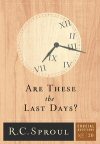
In this booklet, number 20 in the Crucial Questions series, Dr. R.C. Sproul examines the Olivet Discourse, offering a concise interpretation “consistent with the way that it would have been understood by the disciples at the time.” Sproul’s analysis gleans truths regarding who Jesus was, what he really meant, and what his words mean for us today.

Many people in the church today are plagued by doubts about their salvation. Satan whispers that it is impossible that such sinners could be in a state of grace, and some churches compound the problem by teaching that it is possible for believers to lose their salvation.
But assurance of salvation is possible in this life. Indeed, as R.C. Sproul argues in this Crucial Questions booklet, it is the duty of Christians to make their calling sure (2 Peter 1:10). To help believers reach this goal, Sproul defines assurance, shows how we can get it, reveals the blessings it confers, and warns of the dangers of false assurance. Help is here for those who struggle to know where they stand with Jesus Christ.

In this Crucial Questions booklet, R.C. Sproul shows Christians the one sure path to deep, lasting joy: a relationship with God through Jesus Christ. By abiding in Christ, Sproul shows, believers experience fullness of joy—a joy that transcends unhappy circumstances and even permits us to rejoice with others because of the blessed hope Christ provides.

As human beings, we long to know that our lives will unfold in pleasant and rewarding ways. As Christians, we have a different focus—we want our lives to be pleasing to God. Thus, we ponder his will and worry that we are not doing what he wants us to do.
In this Crucial Questions booklet, R.C. Sproul outlines timeless principles for discovering and applying the will of God in day-to-day decisions. He then illustrates how these principles should inform two of the most significant decisions we face in life—the choice of a career and the choice of a spouse. Here is valuable guidance for those who are passionate to follow God.
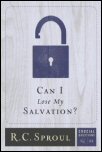
Whether you can lose your salvation is one of the most pressing issues Christians face. In an uncertain world, painfully aware of the continued reality of their sin, and confronted by the Bible’s warnings about falling away, Christians can be tempted to think that true believers can lose their salvation.
In this book R.C. Sproul looks at the teachings of Scripture on the doctrine of eternal security or the perseverance of the saints. In looking at passages on the unforgivable sin, believers who have departed, and the continuing presence of sin in the lives of Christians, Sproul ultimately points to the promises of God, who has vowed to preserve to the end those who are in Christ.
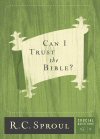
What is the Bible? Can we really trust it? Many people today assume that the Bible is full of errors and contradictions. At best, it is a mildly interesting look at the lives and beliefs of people who lived centuries ago.
While these assumptions may be common, they are wrong, as R.C. Sproul demonstrates in this Crucial Questions booklet. The reason is simple: the Bible is the Word of God. As such, it is trustworthy and authoritative, and what it says is of the utmost importance for every person. In this booklet, Dr. Sproul defines and defends the Bible as God’s unique special revelation to mankind and as worthy of our trust.

In Does God Control Everything?, R.C. Sproul explores and explains the Christian doctrine of providence—the teaching that God is the sovereign ruler of the universe. He then deals with some of the philosophical and theological questions and objections the doctrine raises. His teaching challenges popular assumptions about the universe and exalts God as the sovereign ruler and sustainer of all things.
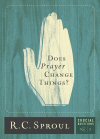
Does prayer make any difference? Does it really change anything? Yes, says R.C. Sproul in this Crucial Questions booklet. Though we cannot hope that our prayers will change God’s mind, prevailing upon him to act against his will, we can be sure that prayer does change things—including our own hearts. Plus, it is one of the chief means by which God carries out his will in the world.
For these reasons, Sproul argues, prayer has a vital place in the life of the Christian. In short chapters packed with practical wisdom, he unveils the purpose, the pattern, the practice, the prohibitions, and the power of prayer, calling Christians to come before God’s presence with joy and hope.

The Bible is clear that true blessing is only found in the presence of God and in his kingdom. Some of the Bible’s clearest teaching about life in the kingdom of God is found in the Sermon on the Mount. It is there that we find the Beatitudes, a series of promises of blessing. In How Can I Be Blessed?, Dr. R.C. Sproul explores these sayings in order to clearly explain what they mean for Christians and to hold up the glorious promise of life in God’s kingdom.

The Philippian jailer’s question is as pressing for us as it was for the man who originally asked it. God is holy, and we are not. God cannot stand to look upon sin. How then can we, as sinners, be saved? This book delves into Scripture and church history to explore the Protestant doctrine of justification by faith alone, and in so doing, it points to Christ alone as our hope for salvation.
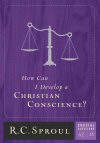
In Walt Disney’s classic animated movie Pinocchio, Jiminy Cricket sings, “Always let your conscience be your guide.” The Bible confirms that the human conscience is real and important, but it also shows that the conscience is not always a reliable guide to making moral choices, for it is twisted by sin. Therefore, a Christian conscience must be nurtured and developed.
In this booklet, R.C. Sproul shows that this development involves learning and mastering the many principles God has laid down in his Word, and even in creation itself. In other words, we must know and understand God’s law. As we gain a firmer grasp of what God expects and requires, we are increasingly able to make decisions that please him.

Christians want to “do the right thing.” But it can be tough to know what the right thing is. Plus, it’s not just the big questions with which we must wrestle—ethical dilemmas confront us each day in every aspect of life. On what basis do we make all of these decisions?
In this Crucial Questions booklet, R.C. Sproul argues that the Bible is the supreme source for ethical guidance. That doesn’t mean it contains a “Thou shalt . . .” or a “Thou shalt not . . .” for every conceivable situation, but it does provide ethical principles. With his trademark wisdom and thoroughness, Sproul explains how we can uncover and apply these principles.

Jesus taught more often on money than he did on love or on heaven and hell combined. Why? It’s because money is one of the chief competitors for our affections. “You cannot serve God and money,” He warned. How, then, should Christians view and use money? How should they view and participate in economic systems?
In How Should I Think about Money?, Dr. R.C. Sproul offers much-needed biblical answers to these questions, and in so doing, provides clarity on an important issue in the lives of Christians.

What must we do with our guilt? In What Can I Do with My Guilt?, R.C. Sproul shows how God can use our feelings of guilt to reveal our true guilt in his sight. He then prescribes the only remedy—the forgiveness that God has provided through Jesus Christ. Here is solid biblical counsel for those who hear the accusations of their consciences.

Jesus himself said that knowing God is an essential part of salvation. We must know who God is, and the way to know God is to learn what he has revealed about himself. In What Can We Know about God?, Dr. R.C. Sproul unfolds Scripture’s teachings on the nature, will, and attributes of God, presenting a glorious picture of our great Creator and Savior.

Jesus was known for presenting many of his teachings in parables, short stories that illustrate a point. In his own day and in ours, Jesus’ stories have often been misunderstood, and their riches have been overlooked. In What Do Jesus’ Parables Mean?, Dr. R.C. Sproul explores the parables of Jesus, laying out their meaning and the rich blessings that they promise to believers.
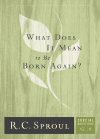
When Jesus explained the necessity of the new birth, the Jewish leader Nicodemus asked in astonishment, “How can these things be?” Some 2,000 years later, much confusion still surrounds the term “born again,” though more people than ever people claim to have had the experience.
In this booklet, R.C. Sproul cuts through the confusion and carefully explains what it means, biblically and theologically, to be born again. He affirms, first of all, that Jesus wasn’t kidding—new birth is essential—then goes on to show what the new birth is and how it occurs. His clear teaching will provide understanding for those who are unfamiliar with the new birth and deeper assurance for those who may not know where they stand with God.
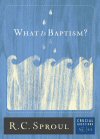
What Is Baptism? affirms that baptism is one of the two sacraments of the Christian church—a sign and seal of the covenant of grace—therefore, it is a necessary and meaningful practice that is packed with rich symbolism. In this booklet, R.C. Sproul provides help in understanding and appreciating this practice of the church.
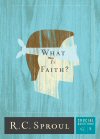
The word faith is heard often these days, but it is given many different meanings. Sometimes it is used in the sense of trust. Other times, it has more to do with hope. Perhaps most often, it is used to mean belief in something apart from rational or empirical support.
Because faith is central to the Christian life, believers must have a clear understanding of how the Bible defines the word and the concept. In this booklet, R.C. Sproul looks to Hebrews 11, the great faith chapter of the Bible, for a definition of faith and numerous examples of it in the lives of the saints. He shows that faith, in scriptural terms, is not believing in God but believing God and living according to his Word. Armed with this helpful teaching, readers will gain clarity as to whether the faith they profess is the genuine article.
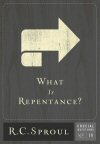
“Repent and believe in the gospel.” From the beginning of his ministry, Jesus called people to repentance. Peter and Paul urged people to repent as well. The concept of repentance is central to the Christian life. But what does it mean to repent? Here Dr. R.C. Sproul unfolds the biblical concept of repentance, especially examining repentance as it relates to regeneration.
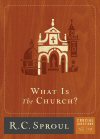
When the word church is mentioned, many people tend to think of a formal building with a steeple and stained-glass windows. For others, the word brings to mind the idea of a denomination. But the church is much more.
In this booklet, R.C. Sproul carefully and clearly explains that the church is a body of people saved by Jesus Christ and regenerated by the Holy Spirit who live to glorify and enjoy God. Beginning with the ancient Nicene Creed, which affirms that the church is “one, holy, catholic, and apostolic,” Sproul provides accessible teaching on one of the most misunderstood of all Christian doctrines.
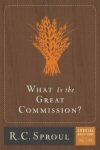
After his resurrection, Jesus gave his disciples a mission: to go to all the nations and make disciples, baptizing and teaching them. That remains the continuing mission of the church today. In this book, R.C. Sproul explores the Great Commission by laying out the biblical basis for missions, defining the gospel and evangelism, and addressing the need to mobilize Christian believers for missions. He also touches on methods of evangelism, while pointing ultimately to the one who promised that he would build his church. This book is a challenge to the church and to individual Christians to obey Jesus’ command to go and make disciples.
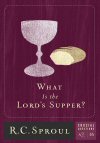
The evangelical church is deeply confused over the sacrament of the Lord’s Supper, with many believers being unclear as to what happens at the Lord’s Table. In some churches, it is practiced infrequently or irreverently.
In this booklet, R.C. Sproul cuts through the confusion to define the Supper, demonstrate what it means, and show how important it is for the lives of believers and churches. He explores the origins of the Supper, explains what it does for us, and refutes erroneous views of the Sacrament. Sproul’s teaching will enhance any reader’s appreciation for the work of Christ as pictured in the bread and wine.
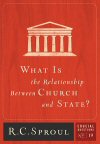
From the very beginning of Christianity, the relationship between the church and the state has been a matter of great concern. The issue remains confusing and contentious for many Christians today, as issues of political activism, religious freedom, and civil disobedience confront those seeking to understand this crucial relationship. Here Dr. R.C. Sproul examines the relationship by looking at the nature and mission of government, how Christians should view and relate to their governments, the legitimacy of state-established churches, how to deal with abuses of power, and the legitimacy of civil disobedience.
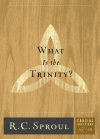
What Is the Trinity? carefully explains the doctrine of the Trinity, stressing that Christians worship one God who manifests himself in three distinct persons. He shows what the Bible teaches about the Trinity and outlines the chief errors Christians make in regard to this crucial doctrine. Above all, he affirms that while this truth is difficult to understand, it is not contradictory. Rather, it is a beautiful expression of the biblical teaching on the nature of God.
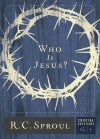
No person in history has provoked such widely divergent assessments as Jesus of Nazareth. Some say he was a cunning fraud, while others say he must have been out of his mind. In many cases his story is altered to suit the fancies of those seeking to make him an ally for a host of militant causes. While there are many ideas about Jesus, to truly understand him, we must go to Scripture. In this edition of Who Is Jesus? from his Crucial Questions series, Dr. R.C. Sproul examines the biblical data and comes away with a compelling portrait of Christ as the Son of God.
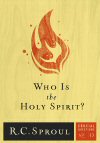
In Who Is the Holy Spirit?, R.C. Sproul addresses this controversial topic by going back to the Bible. He establishes the biblical teaching on the Spirit’s identity—he is one of the three persons of the Godhead, along with the Father and Son—then briefly sketches some of the most basic yet important roles the Spirit carries out. He shows that the Spirit gives new life to unbelievers, then sanctifies, strengthens, teaches, and anoints them for ministry. This booklet provides a basic understanding of the divine person on whom Christians’ very lives depend.
R.C. Sproul is a respected teacher, theologian, pastor, and the founder and chairman of Ligonier Ministries. He currently serves as the director of Serve International and as senior minister of preaching and teaching at Saint Andrew’s Chapel in Sanford, Florida. He can be heard teaching daily on the “Renewing Your Mind” broadcast in over 40 countries. He has written more than 90 books, including The Holiness of God, The Truth of the Cross, How Then Shall We Worship?, and Everyone’s a Theologian: An Introduction to Systematic Theology.
Reviews
57 ratings

Jahyr Eliel Theodoro
11/1/2024
Rey Mindoro
8/6/2024
Young Gun Park
5/29/2024

Jesus Trevino
2/18/2024
David N
12/14/2023
Wallace Scaife
10/22/2023
Yohanan Kwee
9/17/2023

Faithlife User
6/20/2023

Thomas
4/2/2023
Jaesun Kim
1/24/2023